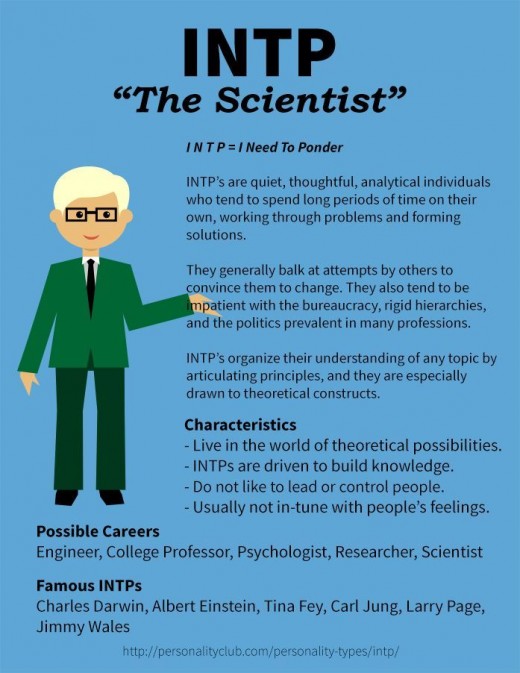- HubPages»
- Education and Science»
- Psychology & Psychiatry»
- Personality Theory & Personality Tests
Seeing Through the Eyes of an Introvert 5 Tips Towards Success
Are You an Introvert, Extrovert or Ambivert?
As an introvert myself, I understand how challenging the external world can be. I refer to myself as an introvert because I have learned over the years that I thrive in solitude. I can go on for hours and days just thinking, reading, day-dreaming, and writing and not feel very tired or drained until I expose myself to social settings, and then it hits me like a MAC truck! It doesn't take long before I realize I am out of my own element.
Introvert and Extroverts
As an introvert, you may perceive the world differently than the majority of the population and may prefer solitude to "recharge". For instance, exposure to the external world may be overstimulating and you may not feel energized by being in large crowds in comparison to an extrovert who thrives in their external surroundings.
Researchers estimate that extroverts make up 50 to 74 percent of the population. However, additional research suggests another type of personality trait called ambiverts, which may alter our perceptions. *An ambivert is a person whose personality has a balance of extrovert and introvert qualities.
Growing up, my family referred to me as being shy, quiet and self-reserved. However, I beg to differ! All throughout my life, I view my experiences through the lens of thinking more than talking due to how I make sense of the world. I do not consider myself to be shy, but I do prefer to be alone quite often, well you know...to ponder and contemplate my thoughts!
If I am not talking, most likely I am listening or analyzing information by thinking, especially when I may be overstimulated while out in social settings. Keep in mind that no one is 100 percent introverted or 100 percent extroverted. "There is no such thing as a pure introvert or extrovert. Such a person would be in a lunatic asylum." --Carl Jung

Contemplate Your Ideas and Refine Your Ideas if You are an INTP

Enjoy Philosophy
"The beginning of thought is in disagreement--not only with others but also with ourselves"--Eric Hoffer
Create A Web Diagram of Your Ideas to Clarify Your Thoughts
- Create a web of your ideas by "branching" out the premise of your theory or argument.
- Provide Ideas that contain absolute knowledge and relative knowledge.
- Work on your premise by adding information such as facts, numbers, and logic to support your theories.
- Gain feedback from others to provoke further discussions and different views by choosing to engage with a small group of like-minded individuals.
- Reach conclusions near the end of your web.

5 Great Tips for Introverts
#1. Let Yourself Elaborate More on Your Thoughts, Ideas, and Concepts
As an introvert/INTP, I can relate to how other introverts feel about sharing their thoughts with others; it's not that easy for us to share much of our ideas until we make sure we gather the facts and data to support our hypothesis that may lead us to share it with others.
#2. USE SM as a TOOL
We live in a world that enables us to use technology for our benefits and sometimes our needs. One thing is for certain, we can utilize Social Media (SM) outlets to help us share some of our thoughts with other like-minded individuals without having to fully endure all the social implications that society ensues upon us.
#3. GET OUT OF YOUR COMFORT ZONE
Having a computer is a life-saver for most of us! A computer is a great tool to use to our advantage. We can provide information to those around us, and we can even get and use feedback just as long as we are able to apply the knowledge accordingly. One thing to keep in mind is to know you will need to get out of your comfort zone to explore new avenues and growth that may be the primary factor towards success. However, you do not need to pretend you are an extrovert to do it. You can build on your ideas, then take breaks to pause and reflect before jumping back into social engagements.
#4. DON'T BE FEARFUL OF TAKING RISKS! Remeber Mind Over Matter
Okay, well, at least try not to let reverse psychology take over your thoughts! Look back in history and you will see how some of the most famous people lived through criticisms, backlash, and resistance. For instance, President Abraham Lincoln (16th. president) was quite a persistent fellow who faced various challenges. For example, his mother died when he was young, he failed in business, faced harsh criticisms, and ran for state legislature and lost in 1832. Additionally, inventors faced severe criticism and were thought to fail such as the automobile created in 1885/86 (Note. it's debatable who created the first automobile), which Chicagoans called automobiles "devil wagons".
#5. Get Out of Your Comfort Zone
To be blunt, to be successful or achieve success in this world, you need to get out of your comfort zone and expose yourself to new ideas, environments, information, data, and most importantly other people. You cannot change your life until you change something you do daily. As much as we don't like to admit, humans are by nature social, inquisitive creatures. Although introverts can get overstimulated by our external environment, we can take the steps necessary to recharge from the external world and jump back in with a new, fresh perspective.

Create Systems that Work for YOU
Brainstorm and Draw a Web Diagram
| Provide Reasoning & Logic
| Logic & Language
|
|---|---|---|
Contains Ideas, Concepts etc.
| Deductive Reasoning--starts from a general rule and leads to a conclusion
| Establish the truth of statements
|
Add on to your thoughts with data, facts, and logic
| Inductive Reasoning--Gather evidence, seek patterns, and reach hypothesis (Note. No amount of inductive reasoning guarantees the conclusion)
| Construct rational arguments
|
Gain feedback for further analysis
| Abductive Reasoning--uses the information gathered
| Ensure ideas have validity through steps and processes that contain math or science
|
QUOTE
"Quiet people have the loudest minds."
--Stephen Hawkings
Brain Facts
BRAIN FACT: Introvert brains function differently than extroverts. Introverts use the long acetylcholine pathway; this has a lot to do with how stimuli are processed in comparison to how extroverts brains' tend to function and process information.
According to research conducted in 2013, extroverts respond to dopamine more than introverts, which is the area responsible for rewards. Research supports that there's a connection between dopamine and extraversion. Extraversion may represent certain differences to which environmental rewards elicit positive (incentive motivation) affective engagement as a means of obtaining those rewards. However, scientists are finding more information about how introverts' brains differ in comparison to an extrovert (frontiersin.org).
Note. Both spellings of the word, Extravert and Extrovert are used. In 1917, Carl Jung referred to an Extravert (turned outward) as a characteristic of an external object, responsiveness and desire to influence and be influenced by events etc. However, in 1918, Phyllis Blanchard, changed the spelling and meaning a bit to the word, Extrovert (Merriam
Webster Dictionary, 2018).
© 2018 Jillian








